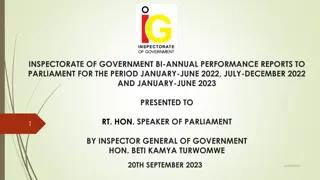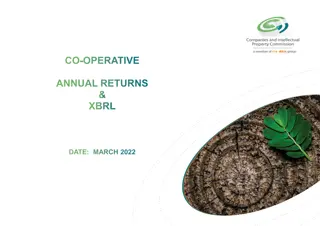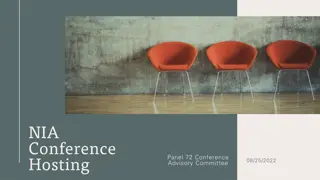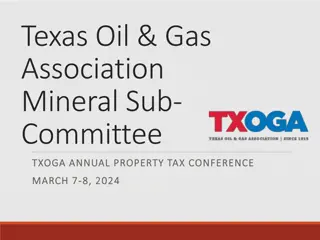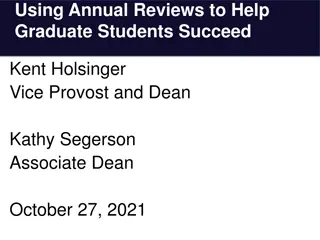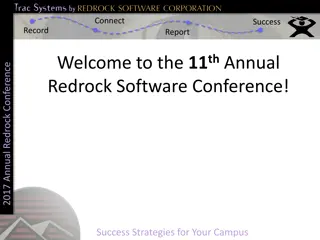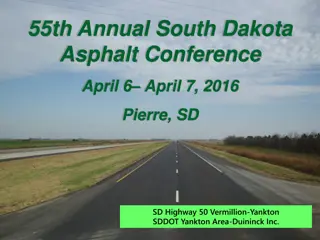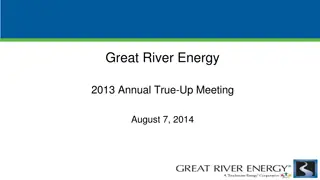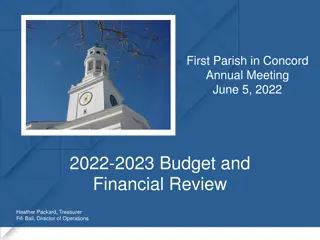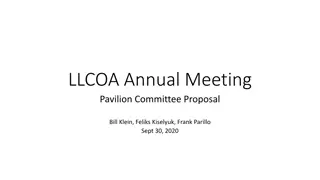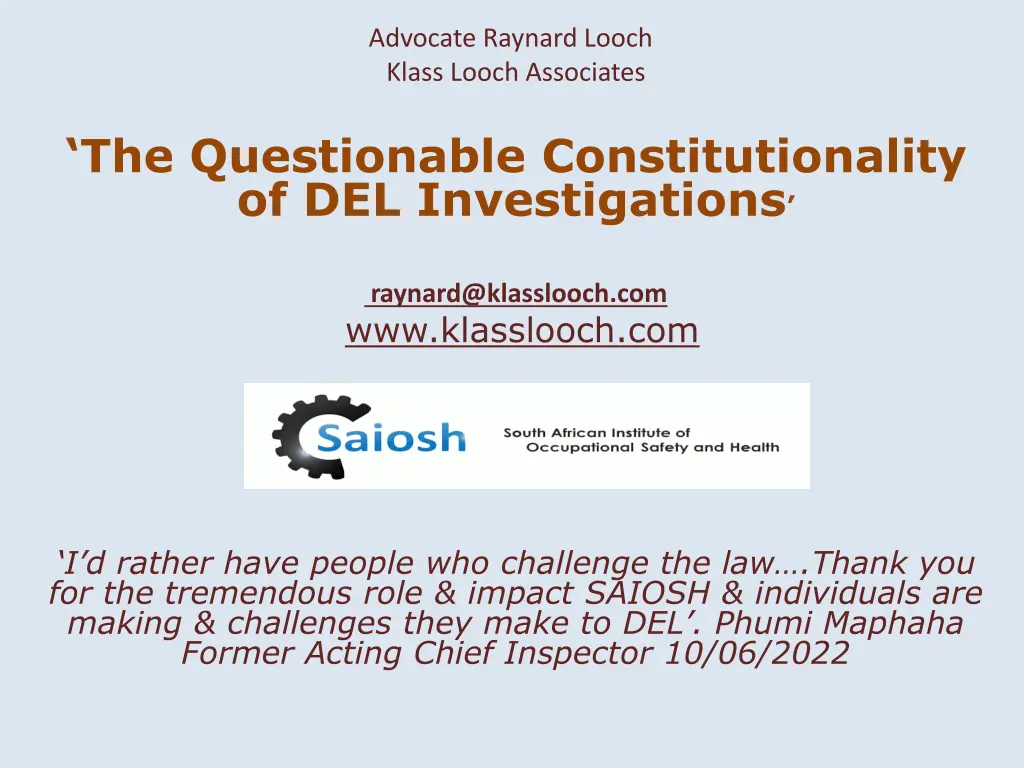
Impact of PAJA on Administrative Investigations in DEL
Explore the impact of the Promotion of Administrative Justice Act (PAJA) on administrative investigations in the Department of Employment and Labour (DEL), focusing on definitions, inquiries, inspector's reports, reasons for administrative actions, and more. Discover how PAJA ensures lawful, reasonable, and fair procedures in administrative actions affecting individuals' rights.
Download Presentation

Please find below an Image/Link to download the presentation.
The content on the website is provided AS IS for your information and personal use only. It may not be sold, licensed, or shared on other websites without obtaining consent from the author. If you encounter any issues during the download, it is possible that the publisher has removed the file from their server.
You are allowed to download the files provided on this website for personal or commercial use, subject to the condition that they are used lawfully. All files are the property of their respective owners.
The content on the website is provided AS IS for your information and personal use only. It may not be sold, licensed, or shared on other websites without obtaining consent from the author.
E N D
Presentation Transcript
Advocate Raynard Looch Klass Looch Associates The Questionable Constitutionality of DEL Investigations raynard@klasslooch.com www.klasslooch.com I d rather have people who challenge the law .Thank you for the tremendous role & impact SAIOSH & individuals are making & challenges they make to DEL . Phumi Maphaha Former Acting Chief Inspector 10/06/2022
Agenda The Constitution The Promotion of Administrative Justice Act (PAJA) Section 31 OHS Act / Section 32 OHS Act Industrial Health Resource Group v Minister of Labour [2015] (GP) (The Paarl Print Fire). Section 72 MHS Act Bert's Bricks (Pty) Ltd v Inspector of Mines, North West Region 2011 Anglogold Ashanti Limited v Mbonambi [2016] (LC)
The Constitution. Section 33 of the Bill of Rights. Just administrative action. 1. Everyone has the right to administrative action that is lawful, reasonable and procedurally fair. 2. Everyone whose rights have been adversely affected by administrative action has the right to be given written reasons. 3. An administrative action means any decision taken, or any failure to take a decision, by- a) an organ of state, when- 4. i) exercising a power in terms of the Constitution or a provincial constitution; or 5. ii) exercising a public power or performing a public function in terms of any legislation. (OHS & MHS Acts).
Promotion of Administrative Justice Act No. 3 of 2000 (PAJA) PREAMBLE WHEREAS section 33(1) and (2) of the Constitution provides that everyone has the right to administrative action that is lawful, reasonable and procedurally fair and that everyone whose rights have been adversely affected by administrative action has the right to be given written reasons. IN ORDER TO * promote an efficient administration and good governance; and * create a culture of accountability, openness and transparency in the public administration or in the exercise of a public power or the performance of a public function, by giving effect to the right to just administrative action.
How does PAJA impact on DEL? Definitions 1. (i) administrative action means any decision taken, or any failure to take a decision, by an organ of state, when exercising a power in terms of the Constitution or a provincial constitution; or (ii) exercising a public power or performing a public function in terms of any legislation. (OHS Act) Investigations / Inquiries Inspector s Report / Prohibition / Contravention / Improvement Notices! Reasons for administrative action. 5. (1) Any person whose rights have been materially and adversely affected by administrative action and who has not been given reasons for the action may, within 90 days after the date on which that person became aware of the action or might reasonably have been expected to have become aware of the action, request that the administrator concerned furnish written reasons for the action. (Inspector s Report)
(2) The administrator to whom the request is made must, within 90 days after receiving the request, give that person adequate reasons in writing for the administrative action. (3) If an administrator fails to furnish adequate reasons for an administrative action, it must, subject to subsection (4) and in the absence of proof to the contrary, be presumed in any proceedings for judicial review that the administrative action was taken without good reason. (4) (a) An administrator may depart from the requirement to furnish adequate reasons if it is reasonable and justifiable in the circumstances and must forthwith inform the person making the request of such departure. How do employers / persons know if there is an adverse finding if DEL refuses to furnish them with the Report? How is it that DEL can ignore the Constitution, PAJA & High Court decisions regarding the Inspector's Report??
Section 31. Investigations An inspector may investigate the circumstances of any incident which has occurred at or originated from a workplace or in connection with the use of plant or machinery which has resulted, or in the opinion of the inspector could have resulted, in the injury, illness or death of any person in order to determine whether it is necessary to hold a formal investigation in terms of section 32. After completing the investigation the inspector shall submit a written report thereon, together with all relevant statements, documents and information gathered by him, to the attorney-general (NPA) within whose area of jurisdiction such incident occurred and he shall at the same time submit a copy of the report, statements and documents to the chief inspector. Upon receipt of a report, the attorney-general (NPA) shall deal therewith in accordance with the provisions of the Inquests Act or the Criminal Procedure Act, as the case may be. An inspector holding an investigation shall not incur any civil liability by virtue of anything contained in the report.
Section 32. Formal Inquiries The chief inspector may, and shall when so requested, by a person producing prima facie evidence of an offence appoint a presiding inspector to conduct a formal inquiry into any incident which has occurred at or originated from a workplace or in connection with the use of plant or machinery which has resulted, or in the opinion of the chief inspector could have resulted in injury, illness or death of any person. Any person who has an interest in the issue of the inquiry may personally or by representative, counsel or attorney put such questions to a witness giving evidence at the inquiry as the presiding inspector may allow. The following persons shall have an interest (i) any person who was injured or suffered damage as a result of the incident forming the subject of the inquiry; (ii) the employer or user involved in the incident;
(iii) any person in respect of whom in the opinion of the presiding inspector it can reasonably be inferred from the evidence that he could be held responsible for the incident; (iv) a trade union recognized by the employer concerned; (v) any owner or occupier of any premises where the said incident occurred; (vi) any person who, at the discretion of the presiding inspector, can prove such interest. MHS Act. Any person who has a material interest in the inquiry. (There usually is prima facie evidence of an offence post an incident unless caused by vis major / casus fortuitus / Act of God). E.g. Earthquake / tsunami / floods / meteors / Prohibition Notice is served ? etc.).
Accident report on workers must be disclosed court. 11 August 2015. Over the years where workers have died in the industrial environment the labour ministry has refused access to reports following official investigations into such tragedies. Now, and thanks to a judgment on Friday in the Gauteng Division of the High Court, they and many other relatives and colleagues of workers who died while at work may at last find closure. The judgment orders the ministry of labour to make available reports under OHSA that are written after investigations into fatal industrial incidents. One of the grounds that the ministry has advanced for not making the reports available is that they are sent to the Directorate of Public Prosecutions (DPP) to decide on whether there should be any prosecutions. As campaigning lawyer Richard Spoor has pointed out, there are seldom any prosecutions. More worrying is the fact that the DPP is on record as having expressed serious concern about the standard of these reports. The poor quality apparently makes further action difficult, if not impossible.
Industrial Health Resource Group and others v Minister of Labour and others [2015] (GP) (The Paarl Print Fire). It is declared that the persons referred to in section 32(5)(c) of the OHSA are entitled, on request to the presiding inspector, to be furnished with a copy of the report contemplated in section 32(9) of OHSA, into any inquiry held in terms of section 32 of OHSA. It is declared that the policy of the DEL to refuse access to a section 32 inquiry report in all instances and without regard to the circumstances of each case once the report is referred to the NPA is inconsistent with OHSA, the Promotion of Access to Information Act 2 of 2000, and the Constitution of the RSA and is accordingly unlawful and invalid . The NPA refused to prosecute despite overwhelming prima facie evidence / damning findings by the former Chief Inspector / Presiding Officer against many companies / persons involved in the project.NPA promised an inquest but it never happened. This verdict should apply to section 31 Investigations too. http://klasslooch.com.www77.jnb2.host-h.net/Industrial-Health-Resource-Group-and- others-v-Minister-of-Labour-and-others-2015/ Read from pages 100 to 116.
It follows that the finding of the Presiding Inspector is relevant to the rights of the dependants of the deceased and those of the injured workers to recover damages from third parties who may be held responsible for the deaths and injuries. Section 32(1)(a) of the Constitution provides that everyone "has the right of access to any information held by the state". This right gives effect to the founding constitutional values of openness and accountability in public affairs. The founding values in section 1 include the pursuit of "accountability, responsiveness and openness". The respondents' interpretation of section 32, in my view, undermines the constitutional values of transparency, openness and accountability in that it deprives interested parties their right to information held by the State. The refusal to disclose section 32 reports violates the right to human dignity provided for in section 10 of the Constitution, in that families and next of kin of workers killed in industrial accidents do not receive an authoritative report on the cause of their loved one's death to enable them to find psychological closure . Bill of Rights. Section 10. Everyone has inherent dignity and the right to have their dignity respected and protected.
Issues. Poor quality of Reports (Not entirely true for high-powered Formal Inquiries by seasoned inspectors) Paarl Print / Tongaat / Grayston. Currently employers only know of an adverse finding in a Report after the issuing of a summons by the NPA depriving them of the right to internally appeal a decision. This is in conflict with PAJA. No testing of evidence at section 31 Investigations. Flouting of audi alterem partem rule Conflicting statements / No recording / No transcript / Heads of Argument. No closure for loved ones. They are kept in the dark since DEL Investigations essentially replace formal Inquests in court. (Unnatural deaths). Deafening silence from unions
Potential constitutional challenges Legal representation is a Constitutional Right and parties must be afforded this right at section 31 Investigations. Flouting this right could pose problems for the NPA. Currently legal practitioners have a muted role. (In MHS Act Inquiries families of deceased employees are afforded this right or may appoint a spokesman ). Not explicit in the MHS Act but practice. Section 31 Investigations don t have a prescribed format. (Perhaps consider Guidelines / GAR Lack of specialised prosecutors (NPA) / Intimidated by technicalities / Overburdened court rolls? Inspector testifying as expert . Report = opinion. State v Ras 1976
Heads of Argument are useful / essential to assist inspectors to compile a coherent Report & for the NPA to make a decision. Essentially the work is done for the inspector. http://klasslooch.com.www77.jnb2.host-h.net/Examples-of- Heads-of-Argument-HOA-OHS-MHS-Acts/ Only way for a successful prosecution is res ipsa loquitur / confession / specialist OHS prosecutor could go it alone without DEL input. A juristic person is entitled to the rights in the Bill of Rights to the extent required by the nature of the rights and the nature of that juristic person. Had the Constitutional Court endorsed the Judgment in Industrial Resource Group, DEL would be instructed to amend section 32.
MHS Act. Section 72. Inquiry records and reports (1) A person presiding at an inquiry must - (a) record the evidence given at the inquiry, At the conclusion of the inquiry, prepare a written report of the findings, recommendations and any remedial steps. Submit a copy of the report and the record of the inquiry to the Chief Inspector of Mines, (d) supply a copy of the report and the record of the inquiry to the employer and to any H & S Rep, H & S Committee or registered trade union that requested the inquiry; and on request, supply a copy of the report and the record of the inquiry to any person who has a material interest in the inquiry.(Family / Interested Parties). (Retained in draft MHS Amendment Bill). The Chief Inspector of Mines must direct an inspector to conduct an (formal) inquiry into any accident or occurrence at a mine that results in the death of any person. Family of deceased are informed & may attend and cross examine witnesses. Retained draft MHS Amendment Bill 2022.
Bert's Bricks (Pty) Ltd and Another v Inspector of Mines, North West Region and Others 2011 North West Region Safety Stoppages (MHS Act) / Prohibition Notices (OHS Act) / PAJA Administrative Actions It seems that not one of the officials properly applied his mind to the operation of the MHSA and that there was a gross abuse of the provisions of the Act. This is most disturbing. This litigation has resulted in a waste of the state's funds (taxpayers' money) and a waste of the court's time. It is striking that throughout these proceedings the Department's officials have failed to give proper consideration to the applicants' complaints and that they have not deemed it necessary to dispute the applicants' factual allegations. In such a case the court should order that the responsible officials must bear the costs of the litigation. However, the applicants have not sought such an order and it requires no further consideration. Court dismissed inspectorate s argument that the Brick making operation was a mine and found that closing the operation costing R913 360.00 / 4 idle days for 300 employees was unlawful. Sadly, taxpayers bore the cost award against DME.
Anglogold Ashanti Limited v Mbonambi & others [2016] (LC) One ought not to use a sledgehammer to crack a nut ! The court concluded that there were no objective facts which would lead a reasonable person to believe that damage caused to a single trackless mobile vehicle necessitated the suspension of the operation of all trackless mobile machinery. Any decision made in terms of section 54 clearly constitutes administrative action for the purposes of the Promotion of Administrative Justice Act (PAJA). An order or instruction is therefore subject to review under section 6 of PAJA. I mention this because the applicant's primary submission in the present application is that the respondents failed correctly to identify dangerous conditions at the mine and respond to them proportionally. Proportionality, of course, is an element of the right to reasonable administrative action established by section 33(1) of the Constitution.
OHS Act. Section 30. Special powers of inspectors. Prohibition Notice Whenever an employer performs an act or requires or permits an act to be performed or proposes to perform an act or to require or permit an act to be performed, which in the opinion of an inspector threatens or is likely to threaten the safety or health of any person, the inspector may by notice in writing prohibit that employer from continuing or commencing with the performance of that act or from requiring or permitting that act to be continued or commenced with, as the case may be. Section 35. Appeal against decisions of inspectors. Any person aggrieved by any decision taken by an inspector under a provision of this Act may appeal against such decision to the chief inspector, and the chief inspector shall, after he has considered the grounds of the appeal and the inspector's reasons for the decision, confirm, set aside or vary the decision or substitute for such decision any other decision which the inspector in the chief inspector's opinion ought to have taken.
The Grayston Bridge Collapse. The deviations from Form-Scaff's sketch weakened the structure to such an extent that it could not withstand the force of the wind on the afternoon it collapsed. That is why it collapsed, DEL found . City Press. Visit http://klasslooch.com.www77.jnb2.host-h.net/The-Grayston-Bridge-Collapse/ for media extracts of the leaked Inspector s Report. .
City Press. The Grayston Bridge Collapse report has been kept under wraps until now. DEL has refused to release the report, but the Johannesburg Development Agency (JDA) provided it to City Press on request, because it is in the public interest. According to the report, the MRC (Murray & Roberts Construction) entrusted the project to a candidate engineer, as site engineer and to the contract manager. Both were inexperienced and lacked the expertise for this specific project. The candidate engineer should have worked under the supervision of a registered (ECSA) engineer who had experience in building bridges or erecting temporary structures. Some of the other deviations include: At the median support, in the middle of the highway, which the entire structure effectively rested on, 21 of 33 diagonal supports had been left out. On both the east and the west side of the highway, reinforcements to the scaffolding were omitted. The deviations from Form-Scaff s sketch weakened the structure to such an extent that it could not withstand the force of the wind on the afternoon it collapsed. That is why it collapsed, the department found .
News24 : It has been nearly three months since the release of a report into the explosion at the Rheinmetall Denel Munition (RDM) factory in Somerset West - but there has, so far, been no consequences. The Department of Employment and Labour was appointed to investigate the events of September 2018. The department established a section 32 inquiry into the explosion, which killed eight people. A total of 26 witnesses, which included technical experts, former employers and current staff and investigators, testified during the inquiry. Nico Samuels, 41, team leader Stevon Isaacs, 51, and operators Mxolisi Sigadla, 40, Bradley Tandy, 19, Jamie Haydricks, 24, Jason Hartzenberg, 22, Triston David, 22, and Thandolwethu Mankayi, 27, were killed in the explosion. The report details several contraventions, including the "failure to conduct the risk assessment when installing a new iris valve, which is deemed as the modification by the employer". RDM specialises in developing, designing and manufacturing large- and medium-calibre ammunition. The inquiry's chairperson made a recommendation for criminal prosecution and said "the incident was caused by an act of omission of criminal nature on the part of Rheinmetall Denel Munition (Pty) Ltd, as represented by Norbert Schultze, the chief executive officer at the time of the incident."
DEL still refuses to furnish Inspectors Report in this 2018 matter. Insists on PAIA. Civil suits for damages are impacted. Transparency?





